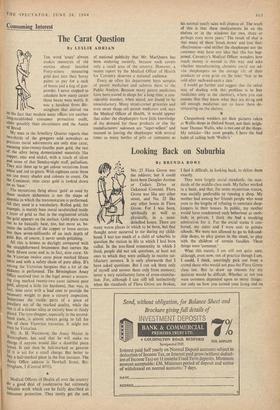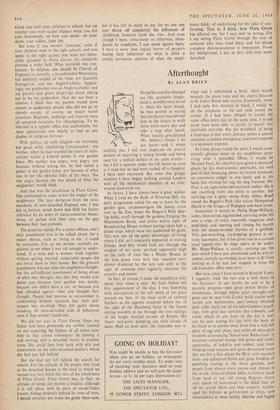Looking Back
on Suburbia By BRENDA ROWE
No. 25 Flora Grove was the address; but it could have been Douglas Avenue or Cedars Drive or Oakwood •Crescent. Flora Grove was like any other street, and No. 25 like any other house in Flora Grove. For I was born, spiritually as well as physically, in a semi- detached house. There are many worse places in which to be born, but that thought never occurred to me during my child- hood. I was too much of a child of suburbia to question the station in life to which I had been called. In the tree-lined community in which I lived, people did not ask questions, at least not ones to which they were unlikely to receive sat- isfactory answers. It is only afterwards that I have asked questions. But I can ask them only of myself and answer them only from memory; never a very satisfactory form of cross-examina- tion. For, although I can still tell instinctively• when the standards of Flora Grove are broken, I find it difficult, in looking back, to define them exactly.
They were largely social standards; the stan- dards of the middle-class snob. My father worked in a bank, and that, for some mysterious reason, was socially preferable to running a shop. My mother had among her friends people who went• even to the lengths of refusing to entertain shop- keepers in their houses. In public, my mother would have condemned such behaviour as snob- bish; in private, I think she had a sneaking admiration for it. For the social status it con- ferred, my sister and I were sent to private schools. We were not allowed to go to fish-and- chip shops, to play games in the street, to play with the children of certain families. These things were 'common.'
What this meant, J am still not quite sure; although, even now, out of practice though I am, I could, I think, unerringly pick out from a crowd those who would not pass the Flora Grove class test. But to draw up reasons for my decision would be difficult. Whether or not you were common depended upon so many things: not only on how you earned your living and on
where you sent your children to school; but on whether you wore carpet slippers when you did your housework; on how you spoke; on your shoes, your collars, your ties.
But even if you weren't 'common,' even if your children went to the right schools, and you spoke in the right accent, you were not neces- sarily accepted in Flora Grove. Its standards covered a wider field. What mattered was con- formity. In religion, one should be Church of England (or, possibly, a broadminded Methodist), but definitely middle of the road; not blatantly Evangelical, and not Anglo-Catholic. Stirpris- ingly, my godmother was an Anglo-Catholic; and my parents had grave misgivings about asking her to be my godmother. Had she not been a relative, I think that my parents would have chosen as godparents people who did not go to church—except, of course, on major social occasions. Baptisms, weddings and funerals were all accepted occasions for churchgoing. To be married in a register office was unthinkable; for open agnosticism was nearly as bad as any display of religious fervour.
With politics as with religion—no extremes, but good, solid, unthinking Conservatism: my brother, when he had reached the years of indis- cretion, nailed a Liberal poster to our garden fence. My mother was angry, very angry; not because, without asking her, he had nailed a poster to her garden fence, nor because of what was to her the obvious folly of his ways. She was angry because she was afraid of what the neighbours would think.
And that was the touchstone in Flora Grove. One conformed in order to win the respect of the neighbours. The least deviation from the strict standards of semi-detached England was, I was led to believe, noted down and filed for future reference by an army of status-conscious house- wives, all poised with their eyes on the gap between their lace curtains.
The penalties varied. For a minor offence, one's only punishment was to be talked about; for a major offence, such as 'living in sin,' it could be ostracism. For, as my mother carefully ex- plained to me when I was old enough to under- stand, if a man and a woman lived together without getting married, respectable people did not invite them to their homes. But the greatest punishment was not what the neighbours thought, but the self-inflicted punishment of being afraid of what they thought; fear that they would con- demn you because your garden was untidy, because you didn't have a car, or because you had offended against what you thought they thought. People had become so accustomed to conforming without question that their self- respect was involved. They felt guilty about breaking the semi-detached code of behaviour even if they weren't found out.
We did not stay in Flora Grove. Once my father had been promoted, my mother insisted on our acquiring the highest of all status sym- bols in that closed community by leaving it and moving into a detached house in another town. She could then look back with pity and amusement on the semi-detached-dwellers whom she had just left behind.
But she had not left behind the search for esteem. For the attitude of the people who lived in the detached houses in the road to which we moved was very much like that of the inhabitants of Flora Grove. Flora Grove was, in fact, an attitude of mind, not merely a locality; although it is still there, with its pairs of mock-Tudor houses, hiding modestly behind its rows of trees. I would certainly not make the grade there now, but it has left its mark on me, for no one can ever throw off completely the influences of childhood, however hard she tries. And even though I have, consciously or otherwise, aban- doned its standards, I can never ignore them. I have a more than logical horror of people's basing their behaviour on what is often a totally erroneous opinion of what the neigh- bours think; of conforming for the sake of con- forming. That is, I think, how Flora Grove has affected me; but I may well be wrong. For I am seeing Flora Grove through the eyes of someone who once lived there, and for whom complete disinterestedness is impossible. From my background, I am, in fact, still only semi- detached.



































 Previous page
Previous page